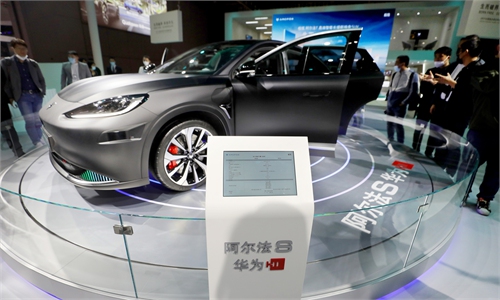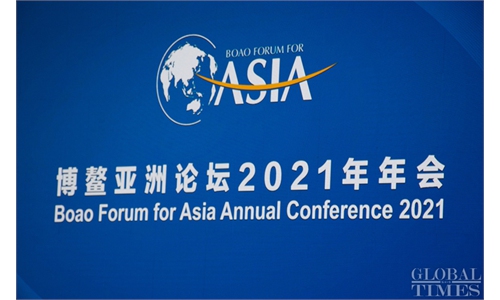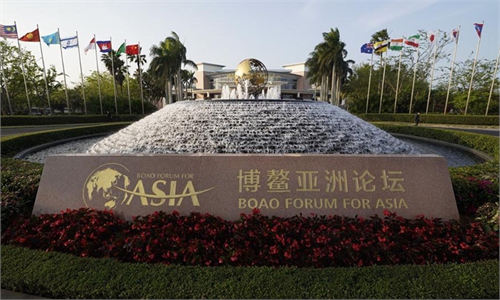Boao Forum sets tone for multilateralism over protectionism
Global leaders, business execs hail China model
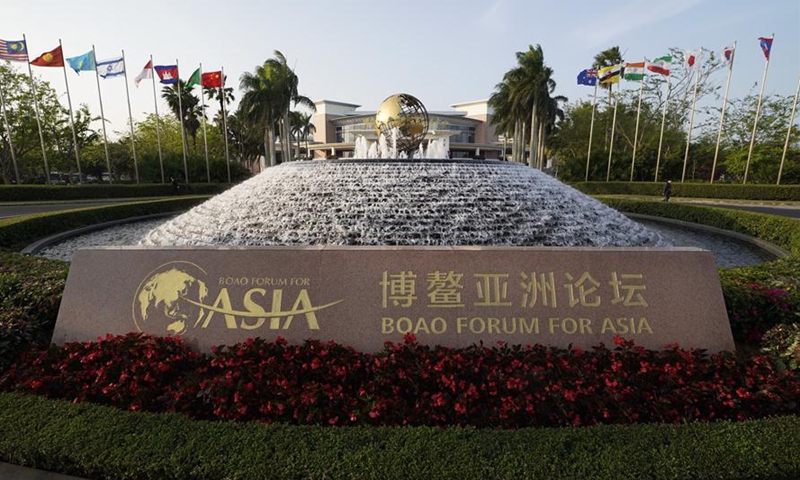
The Boao International Conference Center in Boao, south China's Hainan Province. (File photo: Xinhua)
The high-profile Boao Forum for Asia (BFA) in South China's Hainan Province, an island at the forefront of the country's reform and opening-up, has blazed a trail for a Chinese-innovated model of cooperation that provides a much-needed silver lining for the protectionism-haunted world economy, according to global leaders and business executives who support multilateralism.
The forum, the largest in-person gathering so far this year, apparently sets itself apart from other events like the Group of Seven (G7) which has barriers to wide participation, observers said. The multilateralism-centric conference seems to have convinced foreign businesses to explore an even deeper footprint in the Chinese market.
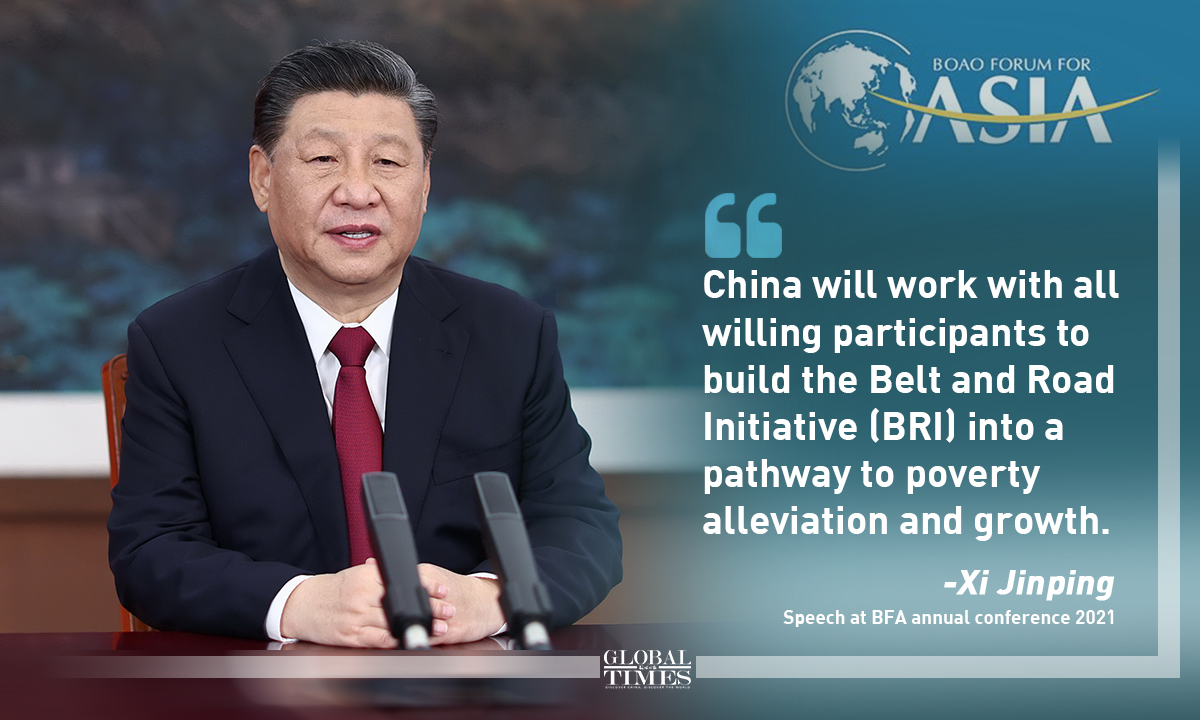
Highlights of Xi's speech at BFA annual conference. Graphic: Xu Zihe/GT
Home field for multilateralism
In a keynote speech via video at the opening ceremony of the 2021 BFA on Tuesday, Chinese President Xi Jinping called for greater global economic integration and warned against a new cold war and ideological confrontation in "whatever form."
"We must not let the rules set by one or a few countries be imposed on others, or allow unilateralism pursued by certain countries to set the pace for the whole world," Xi stressed, according to the Xinhua News Agency.
The Chinese president also expounded on "Chinese concepts" and "Chinese solutions" amid the current international and regional situations, outlining China's solution of building up the development and prosperity for Asia and the world.
China will continue to carry out anti-COVID-19 cooperation with the WHO and other countries, honor its commitment of making vaccines a global public good, and do more to help developing countries defeat the virus, Xi noted, reiterating China's commitment to further opening-up.
The China-proposed Belt and Road Initiative (BRI) also got repeated mentions in his speech. "We will build a closer partnership for openness and inclusiveness," Xi stated, citing a World Bank report which suggests that by 2030, BRI projects could help lift 7.6 million people out of extreme poverty and 32 million people from moderate poverty across the world.
This is the fifth time that Xi attended the forum, either in person or via video link. The 2020 BFA conference was canceled due to the COVID-19 pandemic.
Xi's speech demonstrated the Chinese government's determination to expand reform and opening-up, and also manifested China's commitment as a major developing country to provide a strong boost to the recovery of the global economy in the post-COVID-19 era by promoting international economic exchanges, Leif Johansson, chairman of AstraZeneca, told the Global Times on Tuesday.
The remarks demonstrate China's long-term commitment to economic globalization and participation in global governance, and represent China's collaborative win-win solutions to the world, Johansson said.
The high-level gathering has apparently turned out to be a big shot in the arm for global leaders hoping for multilateralism.
"The interests of all countries are intertwined. The rise of trade protectionism and the politicization of issues have greatly undermined international economic exchanges, said Kazakhstan's First President Nursultan Nazarbayev on Tuesday via video link.
Nazarbayev also said that COVID-19 vaccines should be accessible and affordable to all to effectively prevent the spread of the pandemic. Poor competition and the politicization of vaccines are bad for the global efforts to control the epidemic.
Indonesian President Joko Widodo also said in a video speech that the pandemic has shown that the world is a global village, and collective global leadership is needed.
"Strengthening global governance is based on the spirit of seeking common ground while shelving differences. Asian countries have followed the spirit of cooperation and engaged in more inclusive multilateralism. We hope to boost multilateralism through the RCEP [Regional Comprehensive Economic Partnership]," said South Korean President Moon Jae-in via video link, adding that the epidemic prevention model of Northeast Asia cooperation has set a good example for the world.
The chorus of multilateral cooperation, as opposed to the decoupling confrontation, is considered to have rendered the BFA the home field where the Chinese approach to regional integration and global partnership reverberates, experts said.
Unlike other Western-initiated international gatherings such as G7, which set certain barriers for participation or cooperation and are hence not necessarily open to all countries, especially developing countries, the BFA is open to the world and offers more possibilities for global governance and industrial cooperation, Wang Peng, assistant professor of the Gaoling School of Artificial Intelligence at Renmin University of China, told the Global Times on Tuesday.
The global integration process and multilateral cooperation mechanism have encountered great setbacks, according to Wang, citing the US' move to return to the Asia-Pacific region with initiatives such as the Quad group to form its own cliques to increase intra-Asia confrontation.
The US has exerted its long-arm jurisdiction in the Asia-Pacific region and influenced cooperation within Asia, the expert said, urging countries in Asia to tap regional deals, including the RCEP, to foster greater cooperation and complementarity.
China deposited its instrument of RCEP ratification with the Secretary-General of ASEAN on Thursday, marking the country's official completion of the mega deal's ratification procedure, the Chinese Ministry of Commerce revealed Friday.
Earlier in April, Singapore's Ministry of Trade and Industry announced that the Southeast Asian nation had deposited its instrument of ratification, making it the first among RCEP participating economies to complete the official ratification process.
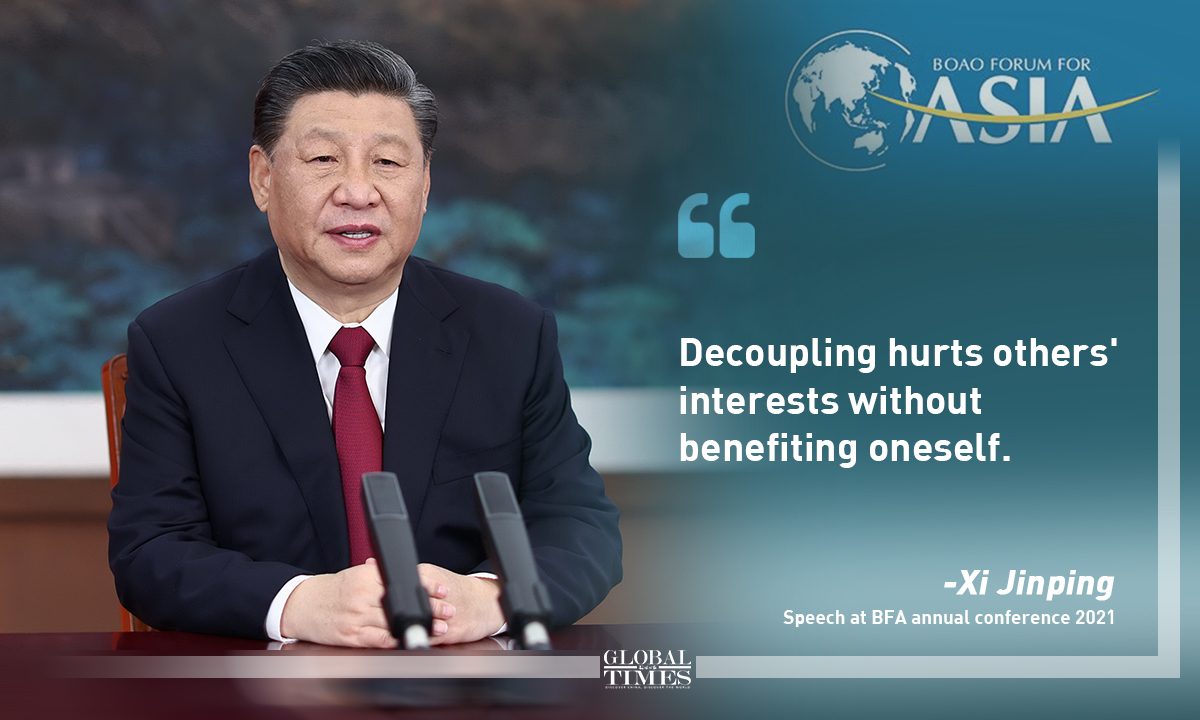
Highlights of Xi's speech at BFA annual conference. Graphic: Xu Zihe/GT
Foreign businesses convinced
The viability of the BFA comes across as boosting the economy's appeal for the foreign business community.
"Despite current geopolitical tensions, China has always been committed to an inclusive attitude of opening-up and cooperation. We believe that the Chinese market will be more dynamic and contains more potential," Sylvain Laurent, executive vice president of French software company Dassault Systèmes, told the Global Times on Tuesday.
During his keynote speech, Xi vowed to fully implement the Foreign Investment Law and its supporting rules and regulations, cut further the negative list on foreign investment, continue to develop the Hainan Free Trade Port, and develop new systems for a higher-standard open economy.
"The fact that this year's forum could take place as scheduled enabled us to appreciate the efforts and the success of the Chinese government in combating the pandemic," Leon Wang, executive vice president of AstraZeneca, told the Global Times on Tuesday.
This, together with China's opening-up commitment, has instilled great confidence in AstraZeneca to extend its roots in China and expand local operations, according to Wang.
China is already AstraZeneca's second-largest market, accounting for about 20 percent of the British-Swedish pharmaceutical giant's worldwide sales.
Describing the BFA as a long-awaited yearly "rendezvous" which comes shortly after China's two sessions as a perfect meeting point to discuss the directions going forward, said Denis Depoux, Roland Berger's global managing director, adding that this year's conference is even more awaited after one year of interruption.
It is critical to restore dialogue and cooperation that have been jeopardized by more than a year of the pandemic, Depoux told the Global Times on Monday.
"What impresses me most is that the BFA, as an important platform for high-level dialogue in the Asia-Pacific region, was still held smoothly as scheduled and all the work was effectively coordinated," Depoux said, noting that this has played a positive role in restoring confidence in the growth of Asia and the world.
